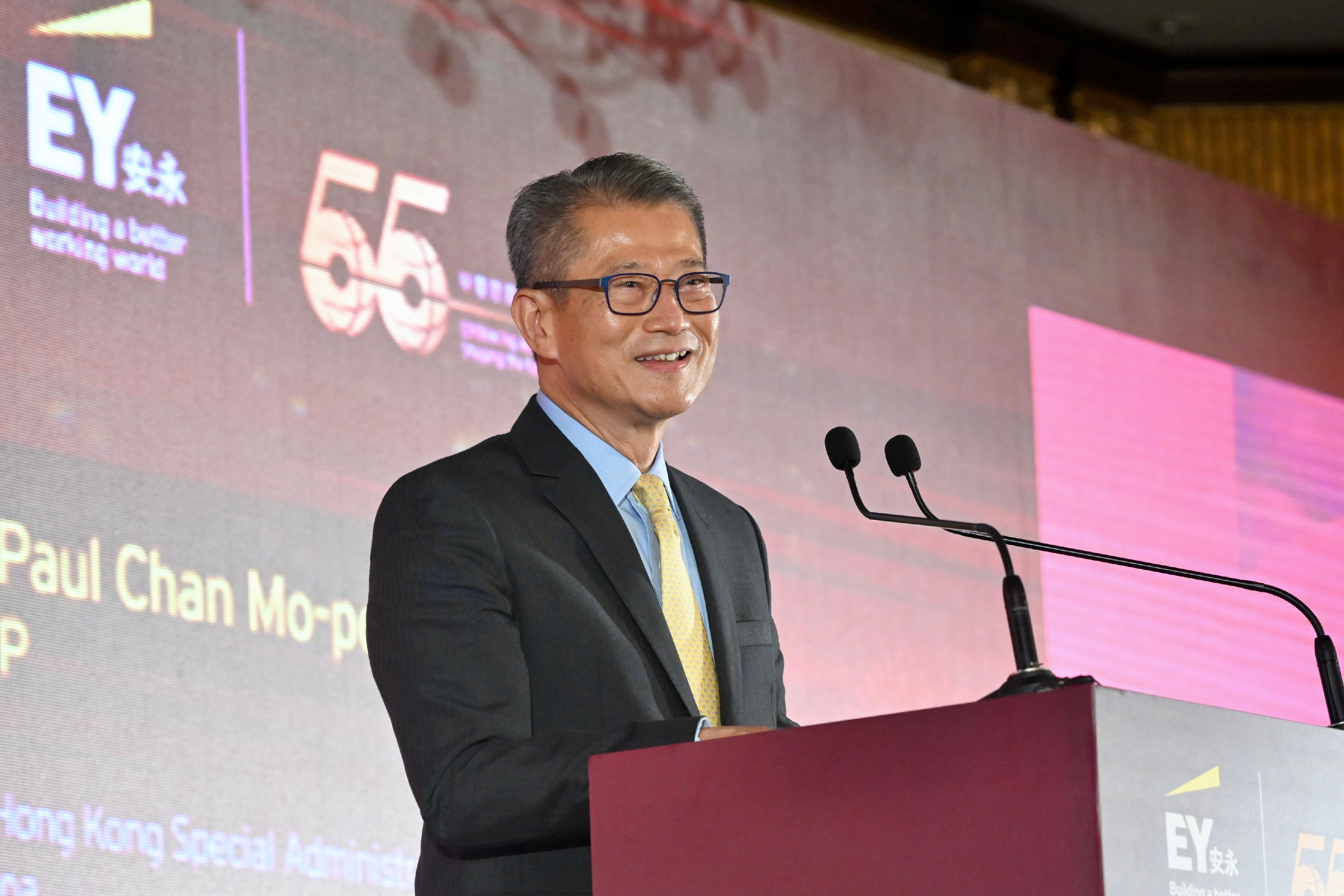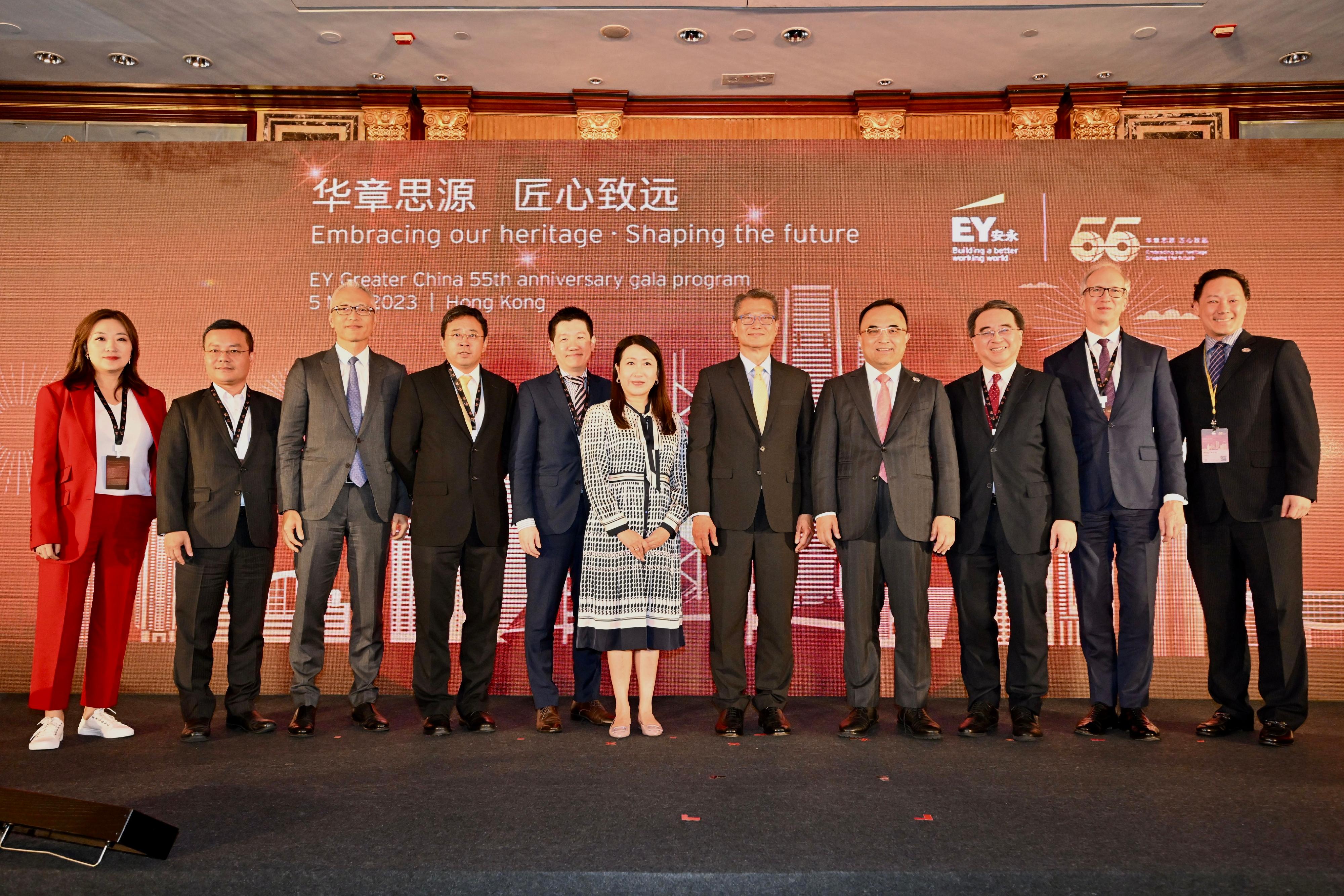Speech by FS at EY Greater China Economics Forum (English only) (with photos)
*****************************************************************************
Jack (Chairman of EY China and Regional Managing Partner of EY Greater China, Mr Jack Chan), distinguished speakers and guests, ladies and gentlemen,
Good afternoon. It is a pleasure to be here today, among so many prominent business leaders, a pleasure to take part in Ernst & Young's inaugural Greater China Economics Forum and to have this welcome opportunity to congratulate EY on its 55th anniversary here in Hong Kong.
From opening as Arthur Young here in 1968, to being among the first international professional services firms to establish operations on the Mainland - in Beijing, in 1981- EY has come a long, inspiring way in Greater China.
Now, as we make our eager way into the post-pandemic economy - the cusp of a bright and bountiful new era - there are plenty of challenges to overcome. In an increasingly polarised world, geopolitical tensions are high. We are contending, too, with a slowdown in global economic growth, as advanced economies grapple with the intertwined problems of inflation and rising interest rates.
Last month, the International Monetary Fund (IMF) forecast that global economic growth would slow down from 3.4 per cent last year to 2.8 per cent in 2023.
For advanced economies, growth is expected to slow visibly - from 2.7 per cent to 1.3 per cent, year on year.
But there are more than a few positives, too - reasons to rise and shine - especially here in Asia. The IMF has forecast that growth in emerging and developing Asia will accelerate from 4.4 per cent in 2022 to 5.3 per cent this year, led by a rebounding Mainland economy.
And I am confident that a sizeable slice of that encouraging development will brighten the Hong Kong economy.
Indeed, over the course of four decades of reform and opening up, the Mainland - now the world's second-largest economy - has grown almost 10 per cent a year, on average, creating a wealth of business opportunities along the way.
And Hong Kong, I'm pleased to say, has played a critical role from the beginning, actively participating in the nation's development, while also realising an enviable level of development for itself - for our economy and our community.
Looking to the future, we must actively align ourselves with national development strategies and integrate into overall national development. The 20th National Congress of the Communist Party of China and the recent "two sessions" in Beijing have shed light on the country's medium-term vision and development strategies.
Central to this is "high-quality development". Among other things, our nation will focus on achieving greater self-reliance and strength in science and technology, building a green and low-carbon economy, supporting the healthy development of the private enterprises, and solidly promoting high-level two-way opening up.
This is also the central theme of my Budget this year. In the short term, our focus is on reinforcing and accelerating economic recovery.
In the medium term, we will strive to drive the economy in the direction of high-quality development and all that it promises.
As the upcoming panel discussion will focus on green finance, virtual assets and fintech, allow me to spend a few minutes to give you some updates on how Hong Kong is progressing in these areas in pursuit of high-quality development.
On green finance, the prosepcts are huge. It has been estimated that Asia will need about US$66 trillion in the coming three decades. The Mainland alone will need US$14.5 trillion over that period.
The good news is that Hong Kong is emerging as a leader in green finance, well positioned to help the world in its long-term progress to zero emissions.
In Asia, Hong Kong issues the largest volume of green and sustainable debt. Last year, the amount was some US$80 billion, registering a growth of more than 40 per cent than 2021. In terms of the amount of international green bond issued, we are No. 1 in Asia.
Amount aside, we have set benchmark for the market. The bonds include multi-currency issuances, in US dollars, euros, renminbi and Hong Kong dollars, with tenures of up to 30 years.
And in February this year, we also issued a tokenised green bond, the first of its kind released anywhere in the world by a government. The issuance showcased Hong Kong's ability to combine the bond market, green and sustainable finance and blockchain technology.
Meanwhile, Hong Kong, together with our sister cities in the Guangdong-Hong Kong-Macao Greater Bay Area (GBA), is home to a strong cluster of greentech industry and start-ups.
Some of them are already finding success in global markets. For instance, I met one young Hong Kong entrepreneur in Davos, Switzerland, earlier this year. She told me that her company's technology involves 3-D printing to help restore coral reef in the oceans. Her company has already expanded into the United Arab Emirates.
Another young Hong Kong entreprenuer I know invented bionic materials, which were inspired by the biological structure of ants living in the Sahara Desert. Such materials are used as coating for the exterior of buildings, which can radiate heat and create cooling, thereby bringing down room temperatures by 5 to 6 degrees Celsius, consequently saving 30 per cent to 40 per cent of energy and costs. The enterprise was born out of our incubation schemes, and the Hong Kong Special Administrative Region Government departments were the first to procure their products.
We are much encouraged by these developments. Our goal is clear and compelling: to position ourselves as a global centre for green technology and green finance.
We are determined to bring together these two sectors so that they will complement each other, better support research and development, product commercialisation and mass production, helping realise a complete and thriving industrial and financing chain.
And then, fintech. Fintech is driving change in the way finance is conducted, allowing financial services to be more accessible and inclusive. And Hong Kong is helping effect that change.
We are now home to a vibrant ecosystem of more than 800 fintech companies and start-ups, large and small. Together, they offer innovative services in mobile payments, cross-border transfers, intelligent financial consultancy, wealth management, virtual asset trading, and blockchain.
Indeed, the Government works with financial regulators and the industry to promote fintech's progress, by providing an enabling regulatory framework, enhancing infrastructure, encouraging financial innovation, and nurturing talent.
It is heartening to see that some of the fintech firms are also opening up markets elsewhere, like those in the ASEAN (Association of Southeast Asian Nations) countries.
At the same time, in digital currency, Hong Kong is collaborating with the Mainland on the use of digital renminbi for cross-boundary payments.
We are also working with a number of central banks on a project called mBridge. It is among the first multi-central bank, digital-currency projects to support real-time, cross-border payments and foreign-exchange transactions using central bank digital currencies. A step that will help make transactions more efficient, save costs and enhance financial statbility.
Web3.0 also presents boundless prospects for financial innovation. The third-generation Internet promises a decentralised, secure, transparent and low-cost environment for financial innovation.
The first step of realising is to put in place a regulatory framework for virtual assets that enables innovation, while providing the necessary guardrails to ensure financial stability and investor protection.
But Web3.0 is well beyond the virtual assets. The blockchain technology provides a decentralised, secure, transparent, low-cost and efficient platform for innovation. It is a technology with huge promising potential.
We are committed to driving the development of Web3.0. Cyberport has been designated as Hong Kong's Web3.0 development centre. In my Budget this year, I gave resources to Cyberport to help boost its efforts in this fast-emerging area.
Ladies and gentlemen, rest assured that the Government will continue to integrate into the nation's overall development, while expanding our international ties, reinforcing our unique role as a gateway and multilevel bridge.
We want to make it as easy as possible for business to be part of this bright new era. And that certainly includes EY.
To help business in general, and to boost our competitiveness in the global economy, the Government has put in place such programmes as the Office for Attracting Strategic Enterprises and a $30 billion Co-Investment Fund to identify sectors and enterprises that are strategically important to Hong Kong.
Coming with the array of initiatives to entice strategic enterprises is our schemes to attract talent. The Talents Service Unit has been set up to oversee a range of new and upgraded talent admission schemes, including, among others, the Top Talent Pass Scheme.
The results so far are encouraging. Since the launch of various new and upgraded talent admission schemes in December last year, the Government had received more than 60 000 applications. And we have already approved more than half of them.
Indeed, in my recent trips to Beijing and Southeast Asia, I visited a number of universities there, which are among the world's top 100. I explained to students and academic staff what was happening in Hong Kong, so as to correct any misconception about us, and share with them the exciting opportuninties that are available here. They are most welcome to come and share a bright future with us together.
Ladies and gentlemen, I urge you to reach out to our Government, to understand more about what we can offer multinational companies looking to partner with Hong Kong. Together, let us build the innovative, inclusive and flourishing future we all want. For our economy, for our community, for all of us.
My sincere thanks to EY for organising today's Forum. And my heartiest congratulations on your 55th anniversary.
Ladies and gentlemen, I wish you all a rewarding Forum and the best of business and health in 2023 and many more years to come.
Thank you.
Ends/Friday, May 5, 2023
Issued at HKT 19:32
Issued at HKT 19:32
NNNN




